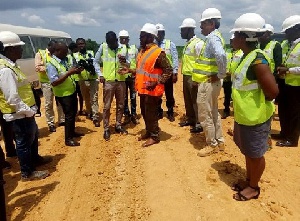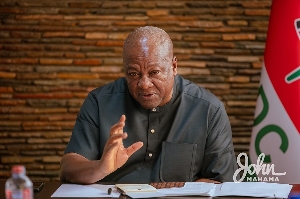General News of Tuesday, 23 October 2018
Source: dailyguideafrica.com
Tema-Akosombo railway line diverted to save dam
The contractors working on the 84km Tema-Akosombo railway line have been forced to divert the track to Mpakadan due to poor feasibility study done on the project by the erstwhile John Mahama government.
The diversion of the track became necessary after the Volta River Authority (VRA), according to the Chief Executive Officer (CEO) of the Ghana Railway Development Authority, Richard Dombo, had raised concerns to the contractors, Afcons Infrastructure of India, about the safety and integrity of the Akosombo Dam.
Mr. Dombo was speaking to journalists on Monday on the sidelines of a tour to the railway line.
According to Mr. Dombo, the feasibility study was hurriedly done on the single-standard gauge project which is on an EPC-basis in 2016 during the NDC’s tenure, for which reason the safety of the Akosombo Dam was not taken into account.
He indicated that instead of carrying out the feasibility study before determining the alignment, the company that undertook the feasibility study at the time – Afcons Infrastructure – rather determined the alignment first, and upon the coming into office of the New Patriotic Party (NPP) administration, it was realized that the original alignment was just 500ft away from the dam which is not safe.
As a result, the project is now being diverted to Mpakadan where the trains will dock, with a 300mm bridge estimated at $25 million to be constructed between Akosombo and Mpakadan so that Akosombo can still benefit from the project.
An official of Afcons Infrastructure who spoke to DAILY GUIDE on condition of anonymity said in 2016 the Ministry of Transport was a party to the feasibility study and virtually took over the entire process, not allowing the company to do the right job.
Another official of the Ghana Railway Development Authority who is not officially authorized to speak to the media but spoke to DAILY GUIDE on condition of anonymity said “the vibrations of the trains would have affected the proper functioning of the dam.”
The said trains expected to be operated on the track run 80 miles per hour (mph) and are deemed to be some of the heavy and fastest moving trains in the world.
With about six decades of existence, the Railway Authority CEO expressed the belief that the structures of the current dam are not strong enough to withstand such pressures from the train, and that forcing the lines to be passed there will amount to putting the dam in danger.
The Akosombo Dam has been the main electricity generation plant for Ghana since independence in 1957.
The construction process for the railway line started on July 3, 2018, and currently the contractors are reportedly on the 66th kilometres.
By June 2021, the project per the contract agreement is due to be completed and handed over to the Ministry of Railways Development and the Ghana Railway Development Authority.
But the contractors are hopeful that by June 2020, a year ahead of the scheduled completion date, they would have completed the project which forms part of the phase six of the Railway Masterplan of Ghana and which is considered as the Eastern Corridor Expansion project that will facilitate the Accra-Ouaguadougou 1,000 kilometres railway line project.
Additional Costs
The diversion of the $388 million, 84km project means that there is going to be extra 13 kilometres, bringing the total expected kilometres to 97.
Parliament approved the project in 2016 in the latter part of the NDC government.
Mr. Dombo told DAILY GUIDE that each kilometre costs about $4.3 million, meaning the state needs an additional $55.9 million to fund the diversion.
According to him, the extra kilometres “are not going to affect the time-scale for completion.”
He also noted that government is in talks with the contractors, Afcons Infrastructure, an Indian company, to see how best they could finance the construction of the extra kilometres.













